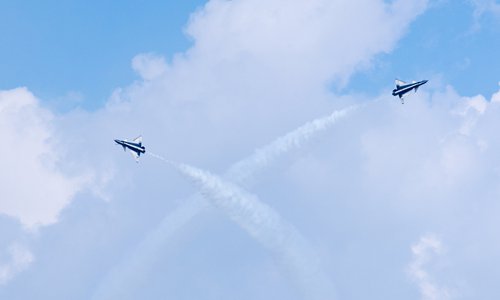HOME >> OPINION
Joint aircraft patrol boosts Russia-China strategic cooperation
By Oleg Ivanov Source:Global Times Published: 2019/7/30 21:06:31

Photo: IC
The first joint Russian and Chinese aerial patrol of two Tu-95MS and two H-6K strategic bombers in the Asia-Pacific region on July 23 and the alleged violation of the airspace of South Korea and Japan according to the authorities of these countries hit newspaper headlines and became a kind of sensation in the world mass media on the whole. What is the significance of this kind of patrol? Why has it caused such a strong reaction from countries like Japan and South Korea as well as the US?The joint aircraft patrol should be considered in the context of the enhanced strategic partnership between Russia and China of past decades on the one hand, and on the other, increasing US economic pressure and deterrence against both countries. Both Russia and China are regarded as a threat to US dominance in the world and the Pacific in particular. Such a perception of Russian-Chinese cooperation in any area is considered as hostile to the US and its allies. It leads to certain unfriendly actions toward the two countries, which undermine stability in the region.
According to the official statement of the Ministry of Defence of the Russian Federation, "The joint patrol was carried out with the aim of deepening Russian-Chinese relations within our all-encompassing partnership, of further increasing cooperation between our armed forces, and of perfecting their capabilities to carry out joint actions, and of strengthening global strategic security."
Despite the South Korean claim that Russian planes entered its air space, the Russian side said later that "two of its Tu-95MS bombers had been on a routine flight over neutral waters and had not entered South Korean territory," The Guardian reported.
South Korea unilaterally established an obscure air defense identification area. This move has been questioned before by Russia. Tass News Agency cited the Russia Defense Ministry as saying that the flights were not aimed at third countries and were conducted within the program of military cooperation plan for 2019.
However, this declaration did not cool emotions in some countries. The US took it as a challenge because after the Cold War no country other than the US and its allies conducted such military missions. It was unexpected that Russia and China could reach this level of military cohesion especially in strategic air force. It was a clear message that Russia and China would like to be equal participants in ensuring regional security.
It is also advisable to highlight two points made by some experts. First, some claim the flights took place over Dokdo, islets disputed by South Korea and Japan, to drive a wedge between Seoul and Tokyo. In my view, this assessment does not stand up as the flights took place in international airspace and they cannot cause a split between South Korea and Japan. Russia is not a party involved in this dispute. Second, some say that China and Russia are trying to set up a counterbalance against the US in relation to the North Korean nuclear issue. My judgment is that this argument is not valid as the North Korean nuclear issue can be resolved as a result of common efforts of all parties involved: North and South Korea, Russia, China, the US and Japan. Both Russia and China are seeking a common solution to the issue.
In the tense and complex Asia-Pacific region, all nations must be careful and make balanced and rational moves. One should not look for a military solution to territorial disputes. At the same time, outside countries should avoid using disputes for their vested interests.
Russia-China relations have reached an unprecedented level. In terms of security they can be described as a strategic partnership but without a similar obligation to the NATO Article V, which states that an attack on one member of NATO is an attack on all. Both countries want to preserve a free hand in their security decision-making. On the whole, Russia and China aim at playing a stabilizing role in the region.
The author is vice-rector of research at the Moscow-based Diplomatic Academy. opinion@globaltimes.com.cn
Posted in: ASIAN REVIEW